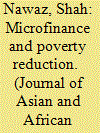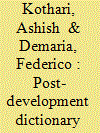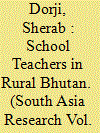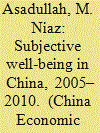|
|
|
Sort Order |
|
|
|
Items / Page
|
|
|
|
|
|
|
| Srl | Item |
| 1 |
ID:
155824


|
|
|
|
|
| Summary/Abstract |
Children in military families experience various stressors associated with the demands of military life, such as parental absences due to deployments. However, there is a limited understanding of children’s well-being to parental deployment from Canadian military families. This study was conducted to examine the impact of deployment on the well-being of school age children from Canadian Armed Forces families and to consider the resilience factors in their well-being. Focus groups with children (N = 85) showed that deployment negatively impacted children’s well-being, routines, and family dynamics. Active distraction and social support seeking served as the most effective protective factors against deployment stress. Recommendations for mitigating the impact of deployment are offered.
|
|
|
|
|
|
|
|
|
|
|
|
|
|
|
|
| 2 |
ID:
191266


|
|
|
|
|
| Summary/Abstract |
Energy poverty is a new growing dimension of inequality in both developed and developing economies. Here, we develop an empirical model to examine the linkage between fuel poverty, income, and high housing costs in developing countries. Our analysis focuses on Egypt, a country that has undergone rapid development and significant energy reforms in recent years. Employing a probit and ordered multinomial framework to data from the Egyptian HIECS Survey, a nationally representative sample of both households and dwellings, we estimate the fuel, income, and housing cost-induced poverty extent and their key determinants. Our results show that households with low income, high energy, and high housing expenses represent approximately 16.4% of the total population, and 7.44% have low income, high energy, and low housing expenses. Our findings on critical factors driving LIHC poverty types (e.g., house type and family size) have some important policy implications for understanding the fuel poverty phenomenon and inequality reduction in Egypt, not only for the LIHC definition but also for any indicator of (fuel) poverty involving the posthousing (energy cost) concept.
|
|
|
|
|
|
|
|
|
|
|
|
|
|
|
|
| 3 |
ID:
186821


|
|
|
|
|
| Summary/Abstract |
This article explores the lived experiences of some Indian migrant workers (MW) during the first COVID-19 pandemic nationwide lockdown, investigating their plights from a social identity perspective. It analyses crises associated with the COVID-19 pandemic, and with hunger and starvation. Drawing on a qualitative study conducted with twelve participants in the city of Pune in the Western Indian state of Maharashtra, the findings suggest that the participants’ plights have been exacerbated by the COVID-19 pandemic. The findings indicate the need for policy responses to focus on addressing conditions of work, terms of employment and access to necessities for Indian MW, including ensuring conditions for a prompt job-ready recovery and mental health care after the COVID-19 pandemic.
|
|
|
|
|
|
|
|
|
|
|
|
|
|
|
|
| 4 |
ID:
190673


|
|
|
|
|
| Summary/Abstract |
This article scrutinises to what extent land ownership improves the well-being of women, focusing on a village in Kerala, a South Indian state known for its land reforms ‘model’ that provided land to the tiller and ownership rights to tenants. However, have these radical land reforms actually succeeded in providing ownership rights to women, thereby contributing to their well-being? We ask in this intensive village study to what extent these admittedly radical land reforms provide adequate land rights to women in Kerala in terms of such ownership translating into absolute and effective rights.
|
|
|
|
|
|
|
|
|
|
|
|
|
|
|
|
| 5 |
ID:
101499


|
|
|
|
|
| Publication |
2010.
|
| Summary/Abstract |
To evaluate the competing claims on the impact of microfinance programs on multidimensional poverty, a village study in Bangladesh was conducted where three microfinance programs had been operating for more than five years. The study found that microfinance has resulted in a moderate reduction in the poverty of borrowers, as measured by a variety of socio-economic indicators, but has not reached many of the poorest in the village. To make microfinance a more effective means of poverty reduction other services such as skills training, technological support, education and health related strategies should be included with microfinance.
|
|
|
|
|
|
|
|
|
|
|
|
|
|
|
|
| 6 |
ID:
190766


|
|
|
|
|
| Summary/Abstract |
Studies show that racial and ethnic identity can significantly improve mental health and well-being among marginalized ethnoracial groups who experience racism and discrimination. However, the relationships between Pan-African identity, psychological well-being, and mental health have received less attention. Using a national sample of African American adults, I examine whether Pan-African identity impacts psychological well-being and self-rated mental health. The results show that respondents who feel closer towards members of the African diaspora and Black people in Africa and prefer Pan-African labels have better self-rated mental health and higher levels of self-esteem. Moreover, the analysis finds that respondents who prefer Pan-African labels have higher levels of mastery. Although self-esteem explains the self-rated mental health benefits of both Pan-African closeness and Pan-African label preferences, only mastery explains the relationship between Pan-African label preferences and self-rated mental health. This study demonstrates the possible psychological benefits of a globalized identity for marginalized groups in Eurocentric contexts.
|
|
|
|
|
|
|
|
|
|
|
|
|
|
|
|
| 7 |
ID:
156646


|
|
|
|
|
| Summary/Abstract |
This article lays out both a critique of the oxymoron ‘sustainable development’, and the potential and nuances of a Post-Development agenda. We present ecological swaraj from India and Degrowth from Europe as two examples of alternatives to development. This gives a hint of the forthcoming book, provisionally titled The Post-Development Dictionary, that is meant to deepen and widen a research, dialogue and action agenda for activists, policymakers and scholars on a variety of worldviews and practices relating to our collective search for an ecologically wise and socially just world. This volume could be one base in the search for alternatives to United Nations’ 2030 Agenda for Sustainable Development, in an attempt to truly transform the world. In fact, it is an agenda towards the pluriverse: ‘a world where many worlds fit’, as the Zapatista say.
|
|
|
|
|
|
|
|
|
|
|
|
|
|
|
|
| 8 |
ID:
170171


|
|
|
|
|
| Summary/Abstract |
In Bhutan, recent increases in annual teacher attrition rates, particularly in rural areas, pose significant challenges for the government and concerned agencies in terms of retaining qualified teachers and reducing teacher attrition rates and turnover. This article, partly based on a field study exploring the quality of work life (QWL) and well-being of school teachers in rural Bhutan, explores the possible reasons why such teachers might seek to resign. Using mixed methodology, the study reveals poor QWL and well-being of teachers, caused by a variety of factors. In view of such findings, the Ministry of Education and the government need to ensure better all-round protection for teachers to avoid the risk of large-scale resignations.
|
|
|
|
|
|
|
|
|
|
|
|
|
|
|
|
| 9 |
ID:
161808


|
|
|
|
|
| Summary/Abstract |
We use data from two rounds of the Chinese General Social Survey (CGSS) to study the determinants of subjective well-being in China over the period 2005–2010 during which self-reported happiness scores show an increase across all income groups. Ordered probit regression analysis of well-being reveals large influence of gender, rural residency, and household income. After controlling for demographic attributes, health status, unemployment status, number of children, agricultural hukou (household registration identity) and educational attainment, household assets, the influence of past and future income, and province dummies, we find that women, urban residents, and people with higher income are happier in China. More schooling, better health, and being employed are positively and significantly correlated with well-being. Sub-sample analysis reveals that the rich only care about relative income whereas the effect of absolute income dominates in case of the poorer section. The influence of absolute income is larger among women compared to men and in turn explains why women, despite being poorer, are happier in China, conditional on socioeconomic differences. On the other hand, rural residents are poorer than urban residents so that conditional on having the same income, there is no rural–urban happiness gap. Our results suggest that while further decline in poverty will enhance well-being in China, policies that reduce rural–urban and gender inequalities are also likely to boost well-being.
|
|
|
|
|
|
|
|
|
|
|
|
|
|
|
|
|
|
|
|
|